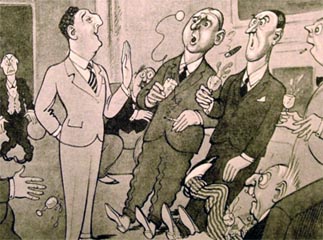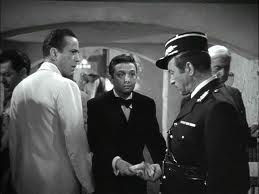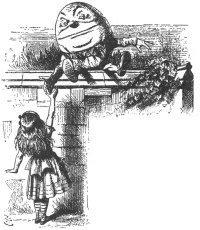
Thomas Rainsborough: Civil War hunk
“For really I think that the poorest hee that is in England hath a life to live, as the greatest hee; and therefore truly, Sir, I think itt clear, that every Man that is to live under a Government ought first by his own Consent to put himself under that Government; and I do think that the poorest man in England is not at all bound in a strict sense to that Government that he hath not had a voice to put Himself under.” Thomas Rainsborough, quoted in the Putney Debates record book of 1647
Yesterday there was a flurry of comments from freeman on the land types on the very first woo piece that I wrote, way back in June last year. I guess that for people obsessed with the Magna Carta that counts as rapid rebuttal, right?
I’ve more or less given up on responding to comments from the woo theorists, it being about as rewarding and effective as arguing with a table. But I’m making a special exception for this comment from “Thomas Wayne”:
but if statutes do not require consent then surely that would be suggesting we are slaves would it not?
are we not governed by consent ?
legislation are rules of a society, who says we have to be a member of said society?
where is the social contract?
Most importantly, why are our constitutional rights ignored and subverted ?
The last question derives, I think, from the woo theorist obsession with the Magna Carta, and I’ll gratefully leave that to the constitutional lawyers and historians. But I’m interested (on a strictly amateur basis) in the questions about consent and government in the rest of the comment, which are perhaps relevant to more mainstream libertarian thought as well.
I think that I understand the impulse to view issues of liberty through a personal lens: the law affects me on an individual level, and is imposed by a remote and authoritarian state. That is by definition a restriction on my personal freedom, in the sense that it prevents me from acting entirely as I might otherwise wish.
But I think that to reduce this to an issue of personal consent to each law, or to government generally, is an error of scale. Government being a state-level institution, the only meaningful consent to it must be at that same level, in the sense of the collective consent of all of the people living in that state.
My individual consent, therefore, would be relevant only as a component of that collective consent. If consent is a precondition to government, and it is the collective will of the people to be governed, then we are governed whether or not it was my own will that we should be.
This is surely what Rainsborough meant: not that a man (and it was only men he had in mind) was not bound by a government to which he had not consented, but that he would not be bound if he had not been given the opportunity to participate in the giving of the collective consent. In democratic societies, at least, most people have that opportunity, albeit that the mechanisms by which the collective will is assessed may be more or less satisfactory according to country.
So if I purport to withdraw my consent from a particular government or from government generally, this does not mean that I cease to be governed. This could only happen if the collective consent was withdrawn, which is to say if a sufficiently large number of my fellow citizens agreed with me.
The alternative view would raise extreme practical challenges. How would we, in everyday dealings, be able to tell who had consented and who had not, and therefore to understand on what basis we are to interact with them?
This is not to say that the consent of the individual would be irrelevant: the collective consent is an expression of multiple individual consents, and any change in that collective consent must start with individuals. The mechanism for expressing that collective consent is, of course, the subject of much theorising and debate.
If the collective consent cannot be changed, however, the only meaningful way in which an individual consent to government could be exercised would be through the withdrawal of the individual from the state altogether. Modern states being generally defined territorially, this must mean physical withdrawal rather than mere refusal to participate.
Every physical territory in the world is governed in some way, so it may be practically impossible to escape the state altogether. On the other hand some states are weaker than others, so there are perhaps places (such as Somalia or Afghanistan) where one could in practice live untroubled by government and law.
But does that mean that one would not be subject to the control of others? The world is now a crowded place, and it seems to me to be a matter of historical fact that where people live in proximity to each other hierarchies develop and those who feel themselves to be stronger seek to dominate others.
And that is the real problem with the idea that individual consent to government is meaningful. Concepts of consent and the social contract are attempts to find a theoretical basis for the fact of government, but they do not in practice describe how the state came into existence.
As Francis Fukuyama has it in The Origin of Political Order:
We might label this the Hobbesean fallacy: the idea that human beings were primordially individualistic and that they entered into society at a later stage in their development only as a result of rational calculation that social cooperation was the best way for them to achieve their individual ends.
The modern state, and the various forms of government that accompany and embody it, are codified and structured expressions of an innate tendency to cooperation, dominance and hierarchy. The choice you have is not between being governed and being free, it is between different types of dominance (or perhaps between being the dom and the sub, as it were).
So the state does not care about your individual consent; it will continue to govern you regardless as long as it has the physical and social power to do so. The state creates and enforces legislation through that same power, which may be more or less coercive according to the form of government.
Collective consent may still play a role, in the sense that if a critical mass of citizenry withdraws it there may be a change in the institutions of the state (perhaps accompanied by a degree of violence). But that is still a matter of power rather than contract, and the state tends to persist even in an altered form.
So pending major depopulation or significant evolutionary change, we are going to be governed whether we like it or not. That government can be more or less coercive, and more or less authoritarian, but it is going to be there.
Is Western government and the legislation it imposes through imperfect democratic mechanisms “slavery”? If you think there is a binary choice between perfect liberty and total loss of autonomy, perhaps, but I suspect most of us are adult enough to accept that there must be some restriction on our freedom to act as we wish.
In any given society at any given time, some of those restrictions may be excessive. But there is at least a debate, and the opportunity to participate in it, about where the limits should lie.
But if that’s too hard, you could just have a tantrum about not being allowed to do whatever you want.
___________________________________________________
Postscript: I don’t have any special expertise in constitutional theory, and this post is essentially me ordering my thoughts on the matter in public. So I won’t be particularly surprised if what I’ve written turns out to be bollocks, but it’d be helpful if you showed your workings when you tell me that.







